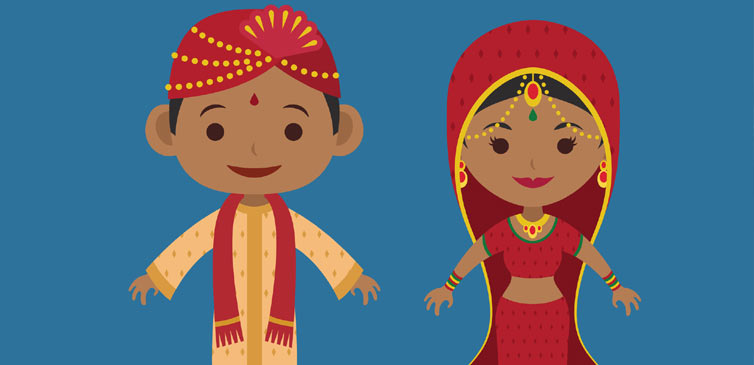Parents and families arrange 55% of all marriages worldwide as per a study done by Statistic Brain in 2012. This statistic is as high as 88.4% in India. And if you thought most marriages result from an ongoing, happy relationship between two people, you probably need to rethink.
Brief overview of the prevalence of arranged marriages in various cultures
Many cultures and communities worldwide have practiced arranged marriages in which the family or a third party plays a significant role in selecting a spouse for an individual. In some cultures, arranged marriages are the norm, while in others, they are less common.
In some traditional societies, arranged marriages are seen as a way to strengthen family and community ties. They may be considered a more practical and secure choice than a love marriage. In many Asian, Middle Eastern, and African cultures, arranged marriages are more common. However, arranged marriages are also found in other parts of the world, including details of South America, Europe, and the United States.
In recent years, the prevalence of arranged marriages has declined in many parts of the world as more people marry for love. However, many cultures still practice arranged marriages and remain a part of traditional and familial values.

Top estimates and statistics on arranged marriage
Here are a few estimates of the prevalence of arranged marriages in various countries in 2023:
- In India, it is estimated that 90-95% of marriages are arranged.
- For Pakistan, around 70-80% of marriages are arranged.
- In Bangladesh, 70-80% of marriages are also estimated to be arranged.
- In the United States, it is difficult to determine the exact percentage of arranged marriages, but they are relatively rare compared to love marriages. The number should be less than 5%
These estimates are rough and may need to be more accurate. Additionally, the prevalence of arranged marriages can change over time and may vary within a single country or culture.
Let’s compare the arranged marriage rates with divorce rates in some countries –
Arranged Marriage and Divorce Rates by Country
| Country/Region | Geographic Distribution | Estimate Arranged Marriages | Divorce Rate |
|---|---|---|---|
| India | South Asia | 90-95% | 1-2% |
| Pakistan | South Asia | 70-80% | 1-3% (estimated) |
| Bangladesh | South Asia | 70-80% | 1-2% (estimated) |
| USA | North America | Less than 5% | 40-50% |
| UK | Europe | Less than 5% | 42% |
| China | East Asia | Less than 10% | 20-25% |
What Are The Top Arguments Against Arranged Marriages?
Let us discuss the top 13 arguments against arranged marriages. Remember that we are only talking about arranged marriages and not forced marriages. In society, an arranged marriage has plenty of room for concealing deal breakers, like the below listed:
1. One is not in control of choosing a life partner
You come into this world with all your existing relations- except one. Finding a spouse is essentially everyone’s right, and arranged marriages also take away that sole right. One does not get to listen to their mind and compare them against their ideals. Most parents believe a meeting or two with the prospective match is enough to decide for a lifetime.
2. Parents decide compatibility
Compatibility can create a successful marriage or make a recipe for disaster. However, in arranged marriages, one must learn more about the other person to gauge the compatibility level in the short courtship period. Most people put their best foot forward.
3. The process is dehumanizing
Some cultures practice selecting the prospective bride based on color, height, weight, etc. The girl is often paraded like a commodity, and the groom can reject her for how she looks- from breast size to a wide smile. People in arranged marriages marry the physical aspects of a person that satiates them, not the qualities.
4. Love is the second priority
In India, at least, arranged marriages are marriages between families. It pressures both partners to meet the opposite family’s expectations. It often leads to frustrations, frequent arguments, and unhealthy compromises – making love take a seat at the end.

5. Extended family interference
Because the complete control of the wedding and everything concerned with it lies with the parents, their involvement stays paramount in the relationship. Sometimes, it could turn nasty with privacy and individuality compromised, making the marriage miserable.
6. Expectations are not clearly defined
We all have some expectations of our life partners, but we rarely discuss arranged marriages. A minimal say in your and your partner’s life could make a wedding unhealthy and unsustainable.
Lack of choice and say in the relationship contributes to dissatisfaction and makes the marriage unsustainable in some cases in the long run. Open communication about expectations is essential for the longevity of any wedding.
7. One ends up living with a stranger
Imagine meeting a person a few times briefly, and the next thing you know, you are sharing a life with them! Bizarre as it may sound, it is the truth. Arranged marriages do not leave one with enough time to get to know each other closely.
Transitioning from being strangers to life partners in arranged marriages is jarring for many people. There is limited time to get to know each other, and it can make things challenging and establish a deep emotional connection. Most of the time, it creates stress and uncertainty.
8. Likely communication gap
One does not know what to expect out of the marriage. One is in minimal control of the relationship and battling family interference. The communication gap creeps its ugly head and becomes a potential relationship wrecker.
Individuals have little say when it comes to the choice of partner. They face regular family interference and uncertainty, which is often stressful. Lack of communication can increase these challenges affecting the relationship. Consent, autonomy, and effective communication are essential in any marriage, whether arranged or not.
9. The relationship takes a long time to bloom
With love a second priority and the weight of family expectations, it is only likely that a relationship will take a long time to bloom. Sometimes, after having children, a couple realizes they are in love! This prolonged “blooming” period can be both a challenge and an opportunity for couples to grow closer meaningfully. This might have both positive and negative impacts based on circumstances.
10. Lovemaking is a chore
With little or no feelings, lovemaking becomes a regular chore for women in the initial stages of arranged marriages. No one talks about what they like or dislike and ‘do it’ because they are married.
However, lovemaking is a “chore” in arranged marriages is a stereotype. It may only apply sometimes. Intimacy in marriage varies depending on the couple’s emotional connection, communication, and personal preferences.
11. Financial loopholes
There is a huge chance that one is unaware of the other family’s financial debts in arranged marriages. Sometimes, one partner must prepare to deal with the in-laws’ financial commitments, which serves as a deal-breaker. Dowry is often associated with arranged marriages to show off the financial status of a family.
12. The low divorce rate but high unhappiness index
Because arranged marriages involve families, people tend to live in bad marriages for fear of bringing shame to the family. Even if a marriage is abusive, many women live in misery and anxiety, as a divorce is unthinkable and will get a bad name on their families. However, the thinking is based more on anecdotal and qualitative evidence, and complex data for it is limited.
13. Potential for abusive or unhappy relationships
It is important to note that while arranged marriages can lead to strong, successful relationships, there is also the potential for them to be abusive or unhappy.
One reason may be that the individuals entering the arranged marriage need the opportunity to get to know each other before getting married. This can lead to misunderstandings and conflicts later on. In addition, in some cases, individuals may feel pressure to go through with the arranged marriage even if they are unhappy with the match, leading to resentment and unhappiness within the relationship.
FAQs for Arranged Marriage
What Is An Arranged Marriage?
An arranged marriage is a marital union of two individuals chosen by the parents and the immediate family. There is a considerable difference between an arranged marriage, where both the bride and groom share a short courtship period and can refuse the marriage, and a forced marriage. Though questionable by modern society, arranged marriages remain the most common means of matrimony in countries that follow a traditional social model.
Are Arranged Marriages Happy Marriages?
Every marriage has a 50% chance of being a happy one. However, you can be delighted if you love the person you vow to spend the rest of your life with. Respect, mutual understanding, cooperation, sensitivity to each other’s needs, financial stability, compatibility, comfort levels, etc., are key metrics that lead to a happy marriage. However, these metrics are subjective and could be missing in an arranged marriage. But because arranged marriages do not give the couple ample time and are suitable to decide on these factors, they take secondary importance.
Are Arranged Marriages Wrong?
In theory, arranged marriages are a perfect way to start married life because divorce rates are almost negligible! But in practice, they are much like a social evil, with individuals having little or no choice over their most important life decisions. They also bring about many other sins, like abuse, dowry, compromises, etc. Love should be the driving force behind a marriage, not family pressures. Kick-starting a new life with someone needs to be a happy, mutually consented decision so that energy is enjoyed in all its glory.
How do arranged marriages impact individuals in India?
Marriages in India are not just two people who take vows to spend their entire lives together. It is actually a festival that lasts for days and involves everyone in the family, neighborhood, and friends. And when the marriage is arranged, the hoopla cannot be ignored. And if you thought marriages are made in heaven, let us remind you that the couple has to live on Earth at the end of the day. And a lifetime isn’t short. Nevertheless, they remain prevalent and leave little or no control over the individual. You could read more about the advantages and disadvantages of arranged marriage here.

2 Comments
There is one aspect of these marriages which to me is sheer horror ..suppose you do not fall in love with each other (which could be the case in most of these marriages), than eventually… the woman gets raped every night for the rest of her miserable life and the guy becomes a genrational rapist for the rest of his miserable life and this goes on and on…all for the sake of financial. cultural and religious reasons and familypressure i would rather die than live like that…
The man is being sold off by his own family like a prized bull and the woman is being bought for the man by his family tike you would buy a whore …only this one is for life ..what a bleak furure for your children i can not imagine a >>Loving family?????doing that to their children a heartless selfish family…. yes ..Shame on you mothers and fathers you should know better .
Are arranged marriages a form of cultural oppression, robbing individuals of their autonomy and right to choose their life partners, or are they a practical and efficient way to ensure marital stability and family harmony?